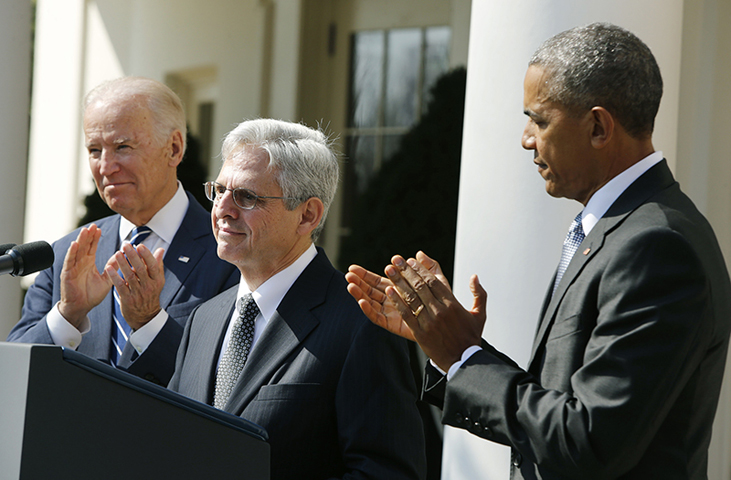
President Obama applauds Judge Merrick Garland, center, of the United States Court of Appeals as his nominee for the U.S. Supreme Court as Vice President Joe Biden, left, joins in at the Rose Garden of the White House in Washington on March 16, 2016. (Reuters/Jonathan Ernst)
President Obama's nominee for the Supreme Court, Merrick Garland, would be the current court's fourth Jewish justice if confirmed.
For Jews, who represent about 2 percent of the population, holding 44 percent of the seats on the court might be a point of pride.
But is it anything more than that?
"On the one hand, we're incredibly proud. He's a Reform Jew and he belongs to one of our synagogues," said Rabbi Jonah Dov Pesner, the head of the Religious Action Center of Reform Judaism, the political arm of the largest branch of Judaism in the U.S. "We're happy for him and we wish him mazel tov and it's a wonderful thing for our movement.
"At the same time, one's faith has no bearing on one's qualifications to be a Supreme Court justice," said Pesner, whose group has criticized Senate Republicans for stating that they will not consider any Obama nominee to the court.
The religion of a justice shouldn't matter, and the most part it hasn't, said Curt Levey, president of the Committee for Justice, a watchdog group that opposes activist judges.
"It's true that the Jewish members of the court right now are liberal and I am sure that has some correlation to the fact that most Jewish Americans are liberal -- not myself, but most are," Levey said.
"But it's certainly not determinative, much like race," he continued. "Most African-Americans are liberal, but that doesn't make Justice [Clarence] Thomas any less conservative."
Chicago-born Garland, 63, was raised in the faith of his mother, nee Shirley Horowitz, who was the director of volunteer services at the Council for Jewish Elderly in Chicago. He and his wife, nee Lynn Rosenman, were married in 1987 at the Harvard Club in New York City by a Reform rabbi, Charles Lippman, according to their wedding announcement in The New York Times.
At the White House on Wednesday March 16, after Obama announced Garland as his Supreme Court pick in the Rose Garden, the nominee shared his family's Jewish background.
"My grandparents left the Pale of Settlement, at the border of Western Europe and Russia, in the early 1900s, fleeing anti-Semitism and hoping to make a better life for their children in America," said Garland, a member of Temple Sinai, a Reform synagogue in Washington, D.C., where both his daughters had their bat mitzvahs, or coming of age ceremonies.
Garland is now chief judge on the U.S. Court of Appeals for the District of Columbia Circuit.
If he is confirmed, the Supreme Court would have five Catholic justices (Chief Justice John Roberts and Associate Justices Thomas, Anthony Kennedy, Samuel Alito and Sonia Sotomayor) and four Jews (Garland and Associate Justices Ruth Bader Ginsburg, Elena Kagan and Stephen Breyer).
Richard Garnett, a law and political science professor at the University of Notre Dame, told RNS that many things about the current Supreme Court and its work would probably have surprised the founding justices. "Especially surprising, though, would certainly have been the fact that every member of the court is Catholic or Jewish (and that one of the Court's Catholics is an African-American descendant of slaves who graduated from Yale).
"It is, I think, noteworthy that, like every Supreme Court nominee for the last 25 years, Judge Garland is not a Protestant," Garnett continued. "In fact, if Judge Garland were confirmed to the Court, it would continue to lack -- as it has since Justice Stevens stepped down -- a single Protestant member."
The last time a Protestant was nominated to the court was in 1990, Garnett noted, when President George H.W. Bush nominated Judge David Souter.
The other candidate considered a likely choice for Obama's nominee was also not Protestant, or Christian for that matter, in a nation that is 70 percent Christian, the largest group of which is Protestant. Judge Sri Srinivasan, who sits on the same court as Garland, would have been the court's first Asian-American and Hindu justice.
Garland, if considered and confirmed by the Senate -- something GOP leaders say will not happen -- has affirmed his ultimate allegiance to the law, as did Justice Antonin Scalia, a giant on the court and devout Catholic who died last month, leaving the vacancy for the president to fill.
"People must be confident that a judge's decisions are determined by the law, and only the law," Garland said as he accepted the nomination.



